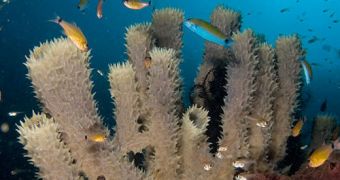Sea urchins are among the factors threatening coral stability around the world. In reefs that are overfished, the number of urchins grows significantly, and the creatures begin consuming coral algae. A new study has shown that coral reefs in areas closed to fishing grow faster and richer.
Inside reefs, intricate food webs and other ecosystemic interactions keep various populations in check. One example is predatory fish, which eat sea urchins, preventing them from doing lasting damage to the corals, and thus endanger all species depending on the organisms for their survival.
But overfishing is depleting stocks at an alarming rate, allowing sea urchins to multiply beyond a level that the remaining predatory fish can handle. When this happens, tropical reef systems become unsustainable, as very few new corals develop.
According to an 18-year-long investigation, it would appear that closing reefs to fishing is the best way to ensure that more corals grow, and that the reef itself develops extensively. The study was conducted in waters off the coast of Kenya, in Africa.
The research was conducted by investigators at the University of California in Santa Cruz (UCSC), in collaboration with activists at the Wildlife Conservation Society (WCS), Science Blog reports.
UCSC expert Jennifer O’Leary and WCS scientist Dr. Tim McClanahan led the investigation, details of which were published in the December 2010 issue of the esteemed scientific journal Ecology.
They say that in all locations where triggerfish and wrasses – natural predators for sea urchins – are missing, the number of crustose coralline algae drops massively. These algae are important to the reefs because they produce calcium carbonate.
“These under-appreciated coralline algae are known to bind and stabilize reef skeletons and sand as well as enhance the recruitment of small corals by providing a place for their larvae to settle,” explains McClanahan.
“This study illustrates the cascading effects of predator loss on a reef system and the importance of maintaining fish populations for coral health,” adds the expert, who is the WCS Senior Conservationist.
He also holds an appointment as the leader of the coral reef research and conservation program at the organization. The Tiffany & Co. Foundation provided critical funding for this study.
“The survival of coral reefs is critical for hundreds of millions of people who depend on these complex systems for coastal protection, food, and tourism revenue around the globe,” Dr. Caleb McClennen says.
“This study demonstrates the importance of improving fisheries management on reefs so that corals can thrive, safeguarding some of the world’s most fragile marine biodiversity and strengthening coastal economies,” adds the expert, who is the director of the Marine Program at WCS.

 14 DAY TRIAL //
14 DAY TRIAL //